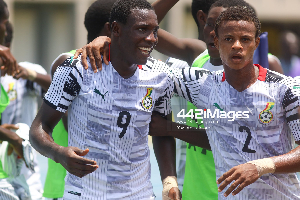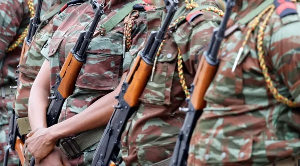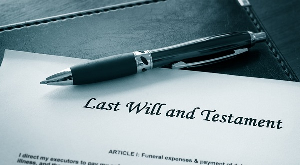Joe hit 60 and we went there to greet him and say well done to him. It was not a birthday party. That was two weeks earlier. Joe is a popular guy in the African community here so there were many people at his birthday party to celebrate with him. He wanted everybody to come and eat, drink, and dance in his honour. He made us all understand that he didn’t want any presents and that our presence at the party was present enough for him. Some people ignored that…
But, today, we met him at his expansive sitting room in his four-bedroom apartment. It was a flat in one of the new building structures going up all over the city because of talk of a certain “housing shortage” that many of us, Ghanaians, didn’t even know existed. How can they have so many buildings and still talk of a housing shortage? They should go to Accra and see what housing shortage is.
Joe's sitting room is cosy. It is huge because it is combined with the kitchen. There is no structure separating the two. Someone said it was a style from the 60s that is making a comeback. I was not here in the 60s so I wouldn’t know. The ventilation was such that even as we sat at one end of the sitting room watching Joe’s wife in the kitchen section making the soup for the fufu, we didn’t smell anything. She could be putting dawadawa into the soup and we wouldn’t smell that from where we were sitting. It was only when, later, we moved to the dining hall section for the meal that we were hit by the sweet aroma of the soup.
Until then, we sat in the sitting room area, drinking beer and whisky (with no one touching the wine – one of those that come from South Africa in three-litre packs) and talking about a wide variety of things. We talked about how there are now so many Africans in the city. Someone said when he arrived here in the 70s, you hardly saw a black face and when you saw one in town or on the train, you nodded your head to him in acknowledgement of your common race. Today, if you want to do that to all the black faces you meet in town, you will come home with a serious headache. Another added that in those days, the girls were easy to get as they were curious about blacks – this country that boasts of its political correctness and would not admit that racism exists in their midst. But, today, there are blacks every where and they are no longer sexual curiosities. The girls are now more difficult to get…
But the conversation didn’t really pick up until we started talking about the “good old days” in Ghana and the Kwame Nkrumah times. All of us had started school before Nkrumah was overthrown. All of us, except the wife who was doing the cooking but was listening to all that we were saying. We all remember very well the day the coup happened.
I said that they had told us of only two things that Nkrumah had done for which they overthrew him. They said that he was a dictator who was oppressing us and also that he had squandered all our money. Mr. Abotsi countered by saying that they couldn’t tell us the real reason why they overthrew him. How could they tell us that it was the CIA that helped overthrow him because he was a progressive leader and wanted to make Africa great and that he was too near the Soviet Union?
Mr Appiah may be the oldest among us. He attended Tweneboah Kodua Secondary School, one of those established under the CPP’s rapid education programme. Those schools were built all over Ghana with decent facilities including posh master’s bungalows. The schools looked similar and may have been built using the same architectural plans. In the 60s, you could find Peace Corps teachers in all those schools. Ghana was among the countries which received the first batch of Peace Corps when Kennedy established the programme in 1961.
Mr. Appiah said it was true that before the coup, Ghanaians had started experiencing some economic hardships. But those hardships were nowhere near what we had experienced in the latter part of the Acheampong regime and the PNDC period. He said Ghanaians noticed the hardships only because they had known better times in the colonial era and the immediate post-independence period. In 1966 there were no shortages of goods in the shops and nobody lined up for anything. People were generally poor but nobody was starving.
He added that the dictatorship they accused Nkrumah of could not be compared with the reign of terror of the PNDC days. Someone said Nkrumah imprisoned his political opponents and allowed some of them to die in prison. There was an atmosphere of fear in the country. You couldn’t say anything against Nkrumah who had declared himself president for life. You feared even saying anything against him in front of your children who were members of the Ghana Young Pioneers. Government officials dreaded the one o’clock news where they learnt of their summary dismissals from office.
Nii Quaye, born 1958 in Accra, said it was true that they were told if you prayed to God, you got nothing but if you prayed to Nkrumah you got candies. He said he was part of his primary school class that went to the Flagstaff House and were told to pray to God which they did but got nothing. They then prayed to Nkrumah and they got candies. No one else was able to corroborate his story. But he insisted it was true.
Sulley was also born in Accra before independence. His favourite jokes are recounting DC Kwame Kwakye’s bad English. His best is the one about Kwakye inaugurating a new water project: "I DC Kwakye, thank you for inviting me to open your new water project. As you all know, water can bath, water can drink, water can cook, water can wash. So, water open … ta ta ta taaa”. There are many variations on this joke and other sayings of DC Kwakye. Many have certainly been embellished over the years but they show Nkrumah’s dependence on ordinary uneducated Ghanaians.
Mr. Appiah recounted an instance of Kwame Kwakye that he saw as a boy. It was at a CPP rally he attended at Bekwai. He remembers Kwame Kwakye, in the middle of the rally, turning to Nkrumah and addressing him thus:
Kwame, emaa no se woho yefe paa. Sre kakra ma wonmoe… Nkrumah couldn’t help it but smiled flashing his perfect teeth. And all the women went woooooooooh…
Mr Abotsi reminded us that the British had not produced many educated Gold Coasters at the time of our independence. Nkrumah knew this. That was why people with little education, like Kwame Kwakye and Krobo Edusei, became important in the government. He said the only person with a degree, apart from Nkrumah, was Ako Adjei. Many of these guys were very young too. Nkrumah was 42 when he became Leader of Government Business in 1951. He was 48 when he became the substantive Prime Minister on independence in 1957 and 51 when he proclaimed himself President of the new republic in 1960. Abotsi added that at the time of independence all these guys were imbued with a sense of patriotism that we don’t see in our politicians today. They were truly determined to make Ghana a success. The idea of political office as a means of enriching oneself had not yet occurred to them. This would come later on.
The conversation then turned to who had really seen Nkrumah live. Not many of us had. Mr Appiah had. Mr Abotsi also said he saw him as a child. He must have been on some campaign in what was then the Trans-Volta Togoland and he, Abotsi, was one of the kids Nkrumah had shaken hands with. He said that he was so delighted that he had refused to wash his hands when he came home, not wanting Nkrumah’s touch to be washed away. Abotsi comes from one of those non-Ewe tribes in the VR who are said to have inhabited the place before the Ewes migrated there. His people had always been supporters of the CPP – right in the heartland of the Togoland Congress people. Nkrumah must have felt at home there.
Someone else said even Nkrumah’s two children, who are currently involved in Ghanaian politics, didn’t quite know their father on a personal basis. They were too young. Samia openly admits she didn’t see much of her father, at least not as a president. I recalled a picture of the president arriving from somewhere and descending the steps of the airplane holding his two children. It is a black and white picture and the kids were wearing white dresses. As kids, we looked at this picture with admiration as we may have seen it on the front page of Daily Graphic or the Ghanaian Times of the day.
I informed the gathering that there has been a resurgence of interest in Nkrumah especially by our youth. This, at least on the internet, had started before Akufo-Addo’s speech marking 50 years of J. B. Danquah’s death. Appiah, who never reads anything on the internet (the technology has passed him by), was surprised. I said it was a good sign that our children who were born long after the man died, are now even more interested in him than the old ones.
Sulley’s wife, now also 60, observed that those who lived and actually experienced Nkrumah’s rule are now dying off or are very old. I agreed with her and added that only a few of them are still writing today. Last year, Cameron Duodu wrote two articles detailing how the President had called him up as a radio newsman to discuss a certain news item. The good old K. B. Asante is still writing as he has always done. In a few years’ time, everybody who had met Nkrumah would be dead.
I said the literature on Nkrumah is probably more than that on all our other heads of state combined. This may be due to the fact that he was our first head of state who, more or less, set the tone for the nation’s future development. But it may also be because he was the most ideologically minded of our heads of state – an ideology that incorporated strong foreign policy elements. Only Busia may be his equal in an ideological persuasion of a counter type. But Busia led us for too short a time to have a lasting impact on our political economy. Acheampong, Rawlings and Kufuor who each led us for long times were not really ideological types. They don’t attract much academic analyses.
Joe left us to help his wife cook the fufu. Everybody wanted to eat fufu – even the Gas. It was cooked in a big pot and the lady needed someone with stronger wrists to do the turning. Even so, it took two rounds of cooking to get enough for everybody. The alcohol had sharpened everyone’s appetite.
After the meal we moved back to the sitting room and continued reminiscing about those old days. Abotsi, with the alcohol now getting into his head (the wine pack was now open), and remembering his Ghana Young Pioneer days in secondary school started singing some of the old songs. Abotsi really had a lot to tell us. After his ‘O’ Levels in Mawuli School, he joined the Ghana army. That was in 1962! He was in the army, stationed in Tamale, when Nkrumah was overthrown. But now, it was the popular Young Pioneer song that he remembered:
Pan African socialist students
Rise in staunch party loyalty
Show devotion to Ghana’s glorious cause
And with discipline advance
Through the bitterest struggle
We will always stand
By the words of Kwame Nkrumah
Fellow comrades rise, raise the battle cry
March on to the new Ghana land…
He still remembers after all these many years. He didn’t quite remember all of the Young Pioneer Pledge but a quick search on the internet helped in providing us with the parts he had missed:
I sincerely promise to live by the ideals of Osagyefo Dr Kwame Nkrumah, Founder of the State of Ghana and Initiator of the African Personality
To safeguard by all means possible, the independence, sovereignty and territorial integrity of the State of Ghana from internal and external aggression
To be always in the vanguard for the social and economic reconstruction of Ghana and Africa
To be in the first ranks of men fighting for the total liberation of Africa, for these are the noble aims guiding the Ghana Young Pioneers
As a Young Pioneer, I will be a guard of workers, farmers, co-operatives and all other sections of our community
I believe that the dynamic Convention People’s Party is always supreme and I promise to be worthy of its ideals.
Abotsi added that the idea of the Ghana Young Pioneers was a great one. It was meant to really instil into the youth a love of their country above all other things. But Nkrumah’s opponents said so many bad things about it.
I reminded him that the GYP was killing off other youth organisations in the country especially the Boys Scouts Movement. If you were a member of the Scouts Movement, you had to buy your own attire – shorts, shirts, boots, scarves, knives, whistles, etc. Buying these things was not easy for youngsters in those days. But as a full member of the GYP, you did not pay a pesewa for anything. You received your dresses, scarfs, hats, boots, etc. free. They were all brand new. And if you were lucky and went through the ranks, you could spend a few weeks in Czechoslovakia or any one of the former eastern bloc countries. You could even get a scholarship to study there.
Mr Appiah said that the fact that Nkrumah allowed himself to be idolised may not have been a good thing and when the appellations started flowing, he may have bought into his own myth. He soaked himself in them. Perhaps, today, he wouldn’t do that. Abotsi said we shouldn’t forget that those were the early days. Nkrumah was a pioneer on the African continent and he didn’t have many examples to learn from. We were experimenting on various fronts. The challenges of nation building facing Nkrumah were daunting. He was a man who was always in a hurry. He made his mistakes but he may, genuinely, have thought he was doing what was best for the country. And he succeeded on many fronts.
Abotsi, as a captain in the Ghana Army, would lead the troops that took over the GBC to enable Acheampong broadcast his coup day speech in 1972. He said the coup was not really planned by Acheampong. It was Major Kwame Baah who was the senior-most officer in charge of the planning and execution even if Acheampong was in on the act. I wanted to know who wrote that thing in Acheampong’s coup day speech about “even the few amenities we were enjoying” during the Nkrumah regime had been taken away by Busia which became a very popular saying in the days after the coup, but he didn’t know if Acheampong came up with that himself. He said it was true that Nkrumah had favoured his President’s Own Guards at the expense of the regular army but Busia had worsened conditions for the officers when he became Prime Minister. Busia had run a very tribal-based campaign to win the elections. The discontent in the army was assuming tribal proportions and the coup was really to avert a bloodier insurrection. Abotsi said he was writing a book about the events since he felt the real story of the 1972 coup has never been told. I have known Abotsi for the past 20 years all of which he has been using in writing his book. Now he claims he is only searching for a publisher. He came here in the late 70s having jumped ship on an AIESEC student exchange programme to this country. He had studied in Legon as a mature student.
The NRC took power some three months before Nkrumah’s death on April 27, 1972. Ghanaians hadn’t heard that he had been taken ill and his death came as a surprise. Many heard it first on the BBC. Abotsi, as someone behind the NRC scenes, said there was a discussion in the Council as to whether his body should be brought back to Ghana. Some members of the council were against it arguing that he had acquired a lot of wealth and was a bad leader who did not deserve a state funeral. The decision was then made to look into his accounts. This revealed that he had a current account with a branch of the Ghana Commercial Bank in Accra into which his salary was paid. He had overdrawn this account by some 40 pesewas or so. Nothing else was found in any bank anywhere in the world that was in his name. He was virtually penniless on the day he was overthrown.
The NRC decided to bring his body back and give him a state funeral. The mood of the country had changed and many Ghanaians were no longer angry with Nkrumah or had forgiven him for whatever wrongs he may have done them. But many had simply chosen only to remember his good deeds and all the good times he gave us. Add to this our traditional reverence for the dead. And when Nkrumah was laid in state at the State House (Job 600), the whole of Accra turned out to see him. People came from all over the country. Everybody wanted to come and pay their last respects. All day long they came to see him. The same Ghanaians who had rejoiced at his overthrow barely six years earlier now endured the heat and the long lines at the State House just to pay their last respects to a man they had glorified in his day. It was a very sad day. I remember it. I was there too. At this juncture, Joe, our kind host, quipped in and said he was sure some of those in the crowd that day were Nkrumah’s enemies who had gone there to personally ascertain for themselves that the man was really dead. This brought a roar of laughter.
By this time, those who were driving home and had not taken any alcohol (the police are extra vigilant on weekends) had gone. Appiah and I were the last to leave. In our inebriate states, we stumbled through the winter darkness, fresh snow on the ground, to the train station. We were headed in opposite directions. His train came first. As I sat waiting for mine, my thoughts went back to Nkrumah. What if the man hadn’t been overthrown in 1966 when he was “only” 57 years old and had continued to rule us? How would he have handled the 1973 oil crisis that affected our economy so much? He would then have been 64 and still president since that was his job for life. What would have been his reaction to the fall of the Berlin Wall and the end of the Cold War in 1989? He would have been 80 then and still president. And would the Busia government have brought his body back from Conakry and given him a state burial if they had still been in power? All these are just speculations worth a thought.
Kofi Amenyo (kofi.amenyo@yahoo.com)
Opinions of Saturday, 28 February 2015
Columnist: Amenyo, Kofi














